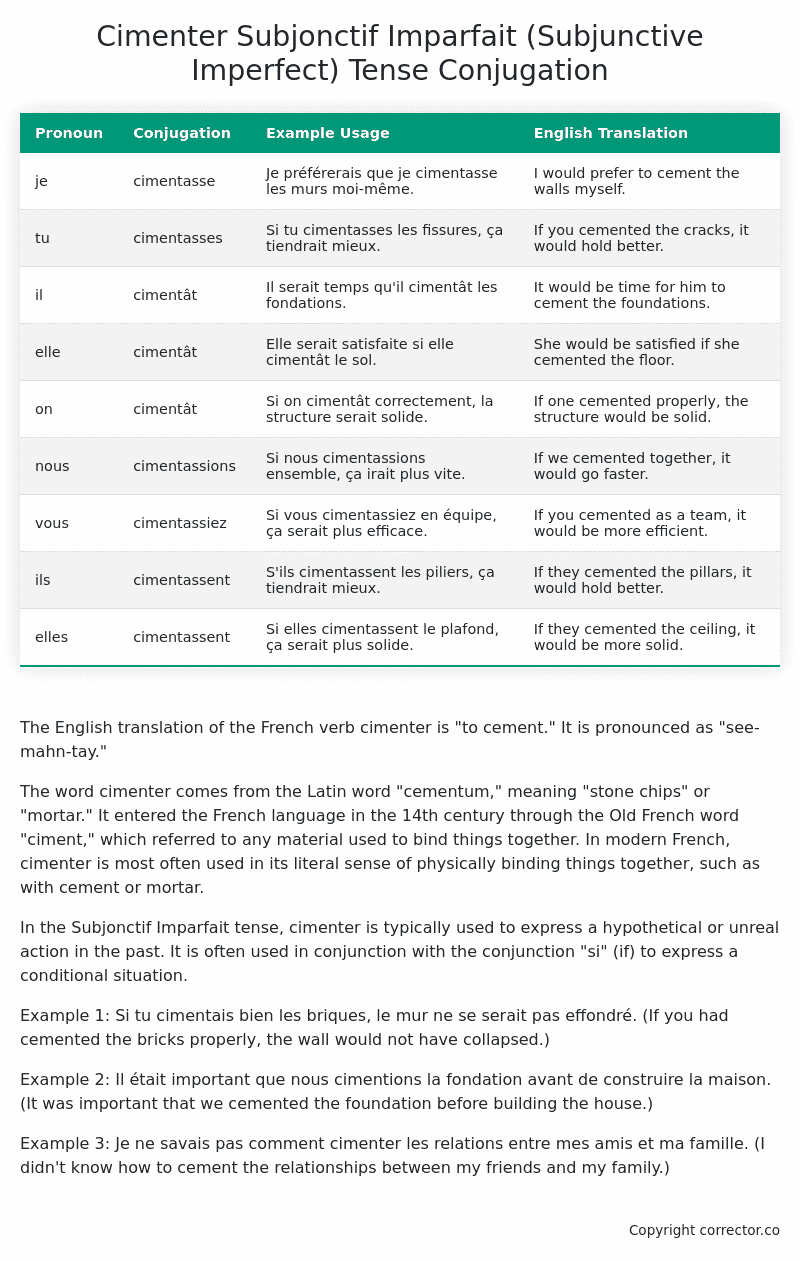Subjonctif Imparfait (Subjunctive Imperfect) Tense Conjugation of the French Verb cimenter
Introduction to the verb cimenter
The English translation of the French verb cimenter is “to cement.” It is pronounced as “see-mahn-tay.”
The word cimenter comes from the Latin word “cementum,” meaning “stone chips” or “mortar.” It entered the French language in the 14th century through the Old French word “ciment,” which referred to any material used to bind things together. In modern French, cimenter is most often used in its literal sense of physically binding things together, such as with cement or mortar.
In the Subjonctif Imparfait tense, cimenter is typically used to express a hypothetical or unreal action in the past. It is often used in conjunction with the conjunction “si” (if) to express a conditional situation.
Example 1: Si tu cimentais bien les briques, le mur ne se serait pas effondré. (If you had cemented the bricks properly, the wall would not have collapsed.)
Example 2: Il était important que nous cimentions la fondation avant de construire la maison. (It was important that we cemented the foundation before building the house.)
Example 3: Je ne savais pas comment cimenter les relations entre mes amis et ma famille. (I didn’t know how to cement the relationships between my friends and my family.)
Table of the Subjonctif Imparfait (Subjunctive Imperfect) Tense Conjugation of cimenter
| Pronoun | Conjugation | Example Usage | English Translation |
|---|---|---|---|
| je | cimentasse | Je préférerais que je cimentasse les murs moi-même. | I would prefer to cement the walls myself. |
| tu | cimentasses | Si tu cimentasses les fissures, ça tiendrait mieux. | If you cemented the cracks, it would hold better. |
| il | cimentât | Il serait temps qu’il cimentât les fondations. | It would be time for him to cement the foundations. |
| elle | cimentât | Elle serait satisfaite si elle cimentât le sol. | She would be satisfied if she cemented the floor. |
| on | cimentât | Si on cimentât correctement, la structure serait solide. | If one cemented properly, the structure would be solid. |
| nous | cimentassions | Si nous cimentassions ensemble, ça irait plus vite. | If we cemented together, it would go faster. |
| vous | cimentassiez | Si vous cimentassiez en équipe, ça serait plus efficace. | If you cemented as a team, it would be more efficient. |
| ils | cimentassent | S’ils cimentassent les piliers, ça tiendrait mieux. | If they cemented the pillars, it would hold better. |
| elles | cimentassent | Si elles cimentassent le plafond, ça serait plus solide. | If they cemented the ceiling, it would be more solid. |
Other Conjugations for Cimenter.
Le Present (Present Tense) Conjugation of the French Verb cimenter
Imparfait (Imperfect) Tense Conjugation of the French Verb cimenter
Passé Simple (Simple Past) Tense Conjugation of the French Verb cimenter
Passé Composé (Present Perfect) Tense Conjugation of the French Verb cimenter
Futur Simple (Simple Future) Tense Conjugation of the French Verb cimenter
Futur Proche (Near Future) Tense Conjugation of the French Verb cimenter
Plus-que-parfait (Pluperfect) Tense Conjugation of the French Verb cimenter
Passé Antérieur (Past Anterior) Tense Conjugation of the French Verb cimenter
Futur Antérieur (Future Anterior) Tense Conjugation of the French Verb cimenter
Subjonctif Présent (Subjunctive Present) Tense Conjugation of the French Verb cimenter
Subjonctif Passé (Subjunctive Past) Tense Conjugation of the French Verb cimenter
Subjonctif Imparfait (Subjunctive Imperfect) Tense Conjugation of the French Verb cimenter (this article)
Subjonctif Plus-que-parfait (Subjunctive Pluperfect) Tense Conjugation of the French Verb cimenter
Conditionnel Présent (Conditional Present) Tense Conjugation of the French Verb cimenter
Conditionnel Passé (Conditional Past) Tense Conjugation of the French Verb cimenter
L’impératif Présent (Imperative Present) Tense Conjugation of the French Verb cimenter
L’infinitif Présent (Infinitive Present) Tense Conjugation of the French Verb cimenter
Struggling with French verbs or the language in general? Why not use our free French Grammar Checker – no registration required!
Get a FREE Download Study Sheet of this Conjugation 🔥
Simply right click the image below, click “save image” and get your free reference for the cimenter Subjonctif Imparfait tense conjugation!

Cimenter – About the French Subjonctif Imparfait (Subjunctive Imperfect) Tense
Formation
Common Everyday Usage Patterns
Interactions with Other Tenses
Subjonctif Présent
Indicatif Passé Composé
Conditional
Conditional Perfect
Summary
I hope you enjoyed this article on the verb cimenter. Still in a learning mood? Check out another TOTALLY random French verb conjugation!


